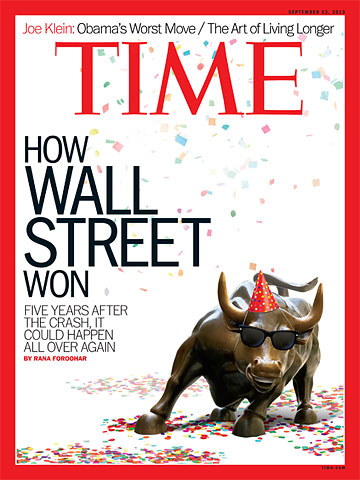
(5 of 6)
Yet they are hardly risk-free. Indeed, as MIT's Johnson points out, the Lehman Brothers crisis resulted in at least one fund "breaking the buck," or returning less than 100% of investors' money, though in this case the losses were mostly absorbed by large institutions rather than individuals. That could change the next time around, which is why the SEC has proposed new rules for money-market funds in order to make them safer. But again, the financial industry has opposed them, citing higher costs that would reduce returns. The result is a glacial pace of reform. Proposed rules may well die or get watered down to nothing. "Shadow banking, including areas as seemingly innocuous as money-market funds, is spreading risk and volatility in the system," says Rob Johnson, head of the Institute for New Economic Thinking. Regulating Wall Street and shadow banking shouldn't be an either-or proposition--both need better oversight.
No. 5
Reboot the Culture Of Finance
Banking was created to serve the real economy, not the other way around. But the U.S. economy has gone so far down the path of financialization, becoming so deeply embedded in and beholden to Wall Street, it's hard to remember that the original business of banks was very simple: lending to real people and businesses. The biggest banks make up a larger share of GDP than before the crisis. Yet access to credit for individuals and the small businesses that create the majority of new jobs remains tight, and economic growth remains below its long-term trend level.
During the financial crisis we were told we had to grease the wheels of banking in order to keep the rest of the economy on track. That has proved wrong. Academic studies show that as finance has grown to be a larger percentage of the economy over the past 30 years, new-business creation has actually stagnated. Banks got bailed out; the real economy is still waiting. Many core problems of the crisis remain: for example, government-sponsored enterprises like Fannie Mae still back 90% of home mortgages, and it's not clear that the structures to support a healthy private system are yet in place.
Academics like University of Texas professor and financial-crisis expert James Galbraith worry that in the age of high-frequency trading and global banking, lending to the real economy has become a relatively less attractive business model. "As the economist Hyman Minsky once put it, 'If you want small business, you need smaller banks,'" says Galbraith.
